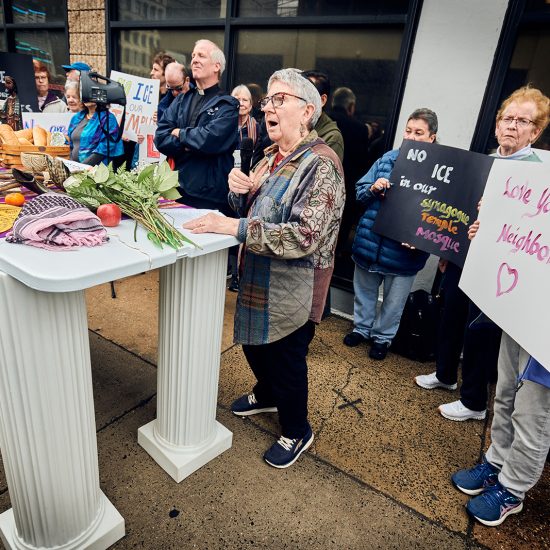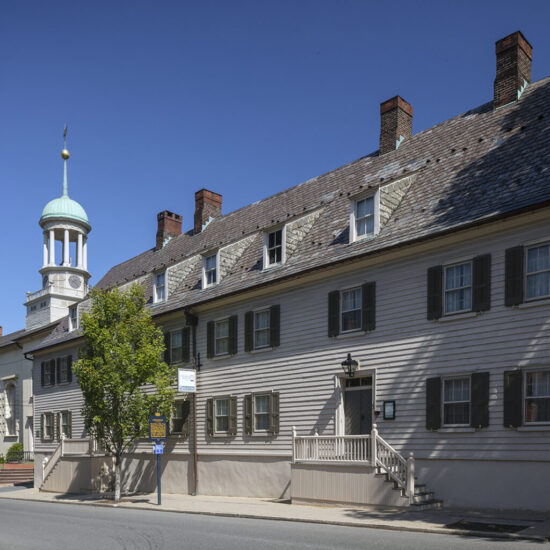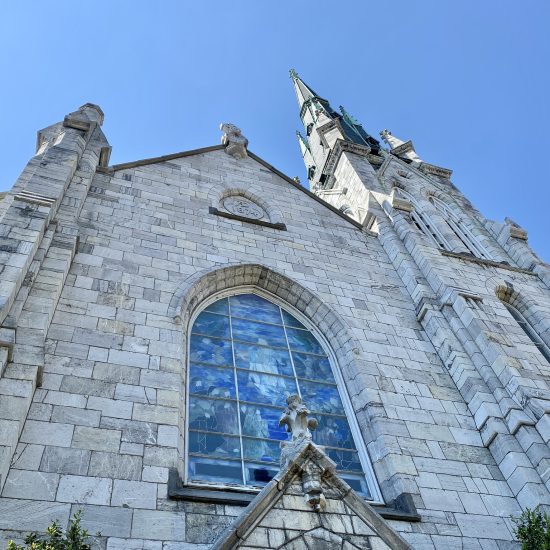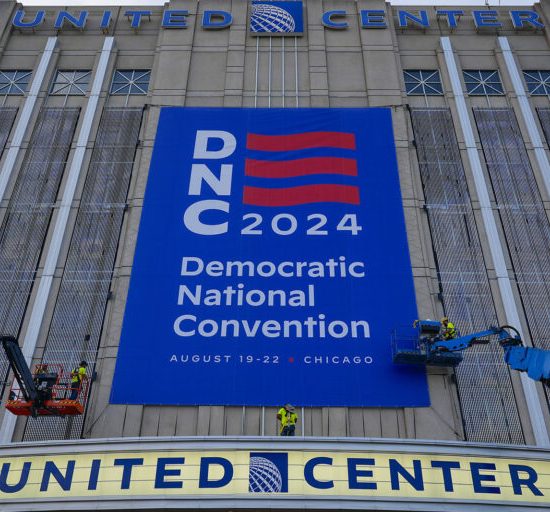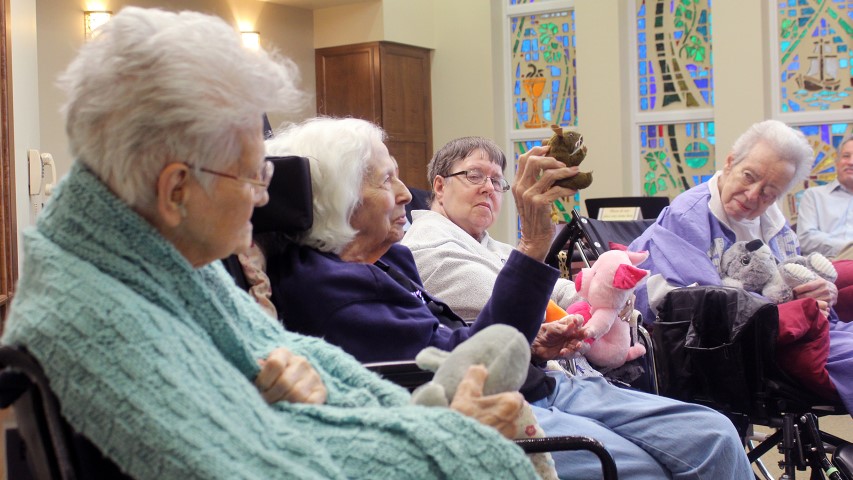
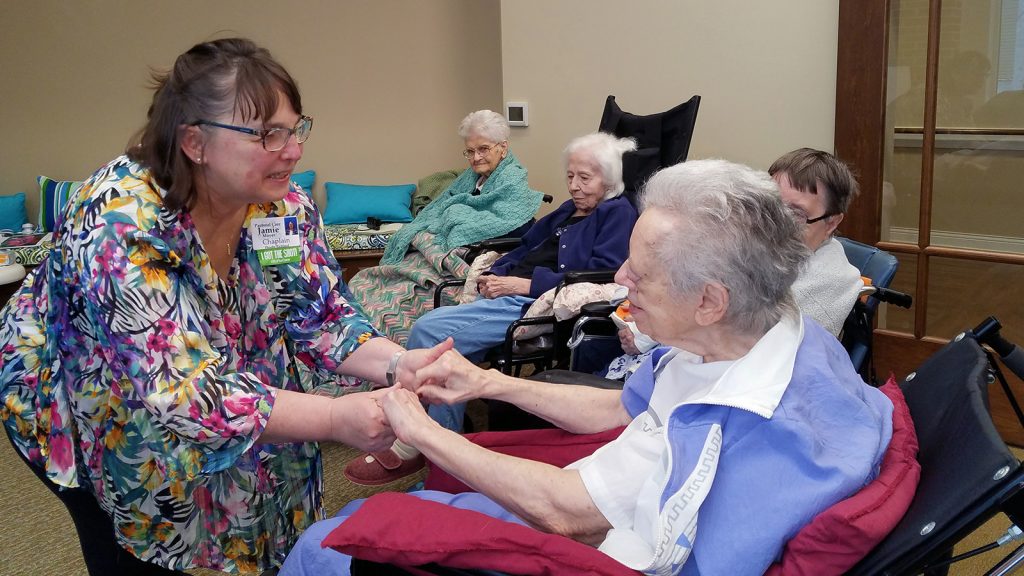
The Rev. Jamie Moyer, left, chaplain at Phoebe Richland, a skilled nursing center in Richlandtown, Pa., greets resident Shirley Derstine on Nov. 5, 2018, for a “Spirit Alive” service. RNS photo by Adelle M. Banks
Dementia is the overall term for the memory loss and cognitive impairment that results from diseases such as Alzheimer’s. It progresses as damage to the brain disrupts normal communication between brain cells and, in turn, affects behavior and thinking.
RICHLANDTOWN, Pa. (RNS) — The seven women, most in wheelchairs, sat in a semicircle facing stained-glass windows and an altar topped with a cross and a statuette of Jesus holding a lamb. Underneath the draped table was an ark-shaped container brimming with small stuffed animals.
“Spirit Alive,” a weekly multisensory worship service for people with mid- to late-stage dementia, was about to begin at a United Church of Christ-affiliated skilled nursing center 50 miles north of Philadelphia.
The Rev. Jamie Moyer carried out the day’s theme of creation by leading “He’s Got the Whole World in His Hands,” holding up pictures of colorful flowers and passing out the soft toys, with each woman choosing one to hold.
“God looked at you and said, ‘Oh, I created you, Ruth,” she said to one resident, as she held up a mirror to the woman’s face and went around the semicircle to affirm each person. “‘I love you very, very much.’”
The 45-minute service, held at each of Phoebe Ministries’ four nursing homes, is one example of how faith leaders are moving beyond traditional worship services to provide a spiritual space for people with dementia. Experts say retirement communities and congregations need to incorporate ways of not only caring physically for people with dementia but also helping them to continue to have a quality of life that may include a spiritual dimension.
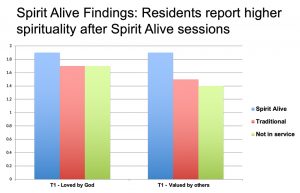
“Spirit Alive Findings: Residents report higher spirituality after Spirit Alive sessions” Graphic courtesy of Phoebe Ministries
The U.S. Centers for Disease Control and Prevention estimates that more than 5.7 million Americans have Alzheimer’s. Experts predict twice as many Americans 65 and older will have the disease by 2040.
A 2014 review of studies of older adults with dementia found that those involved in spiritual and religious practices had a better quality of life. Phoebe Ministries’ own research has shown that residents with dementia involved with the Spirit Alive program are more engaged during worship and reported feeling closer to God.
The day before Moyer’s specialized sermon on creation, Rabbi Beth Janus pulled out her guitar in a meeting room of an Elkins Park synagogue about an hour away and sang and strummed songs she hoped might spark memories around the table.
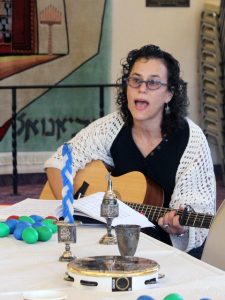
Rabbi Beth Janus sings during “Jewish Music for the Mind and Soul” at Beth Sholom Congregation in Elkins Park, Pa., on Nov. 4, 2018. RNS photo by Adelle M. Banks
Joining her for the “Jewish Music for the Mind and Soul” program were a husband with his wife, who had been diagnosed with Alzheimer’s a couple of years before, and another woman with dementia accompanied by her caretaker.
The first woman sang along occasionally with selections that included Hebrew songs, the spiritual “Go Down Moses” and “Sunrise, Sunset” from “Fiddler on the Roof”; she sometimes accompanied Janus’ guitar with a blue egg-shaped shaker. The other woman didn’t open her mouth to sing but watched Janus intently for much of the hour and a half they spent together around a table decorated with a wine glass, a multi-wick candle and other emblems of Havdalah, the ceremony marking the end of Shabbat.
Karen Avart and her accompanying husband, Stewart, are members of the congregation who attended after receiving an email about the Sunday midday program. They looked forward to returning.
“We’ll be back,” she said, adding that she particularly liked the melody of “Shalom Aleichem,” a song of peace traditionally sung by Jews on Friday nights as they start the Sabbath. “It’s nice.”
Her husband added that he enjoyed the gathering, which provides a sense of community beyond synagogue services they occasionally attend.
“If it makes Karen happy, it makes me happy ’cause that’s my primary goal,” he said.
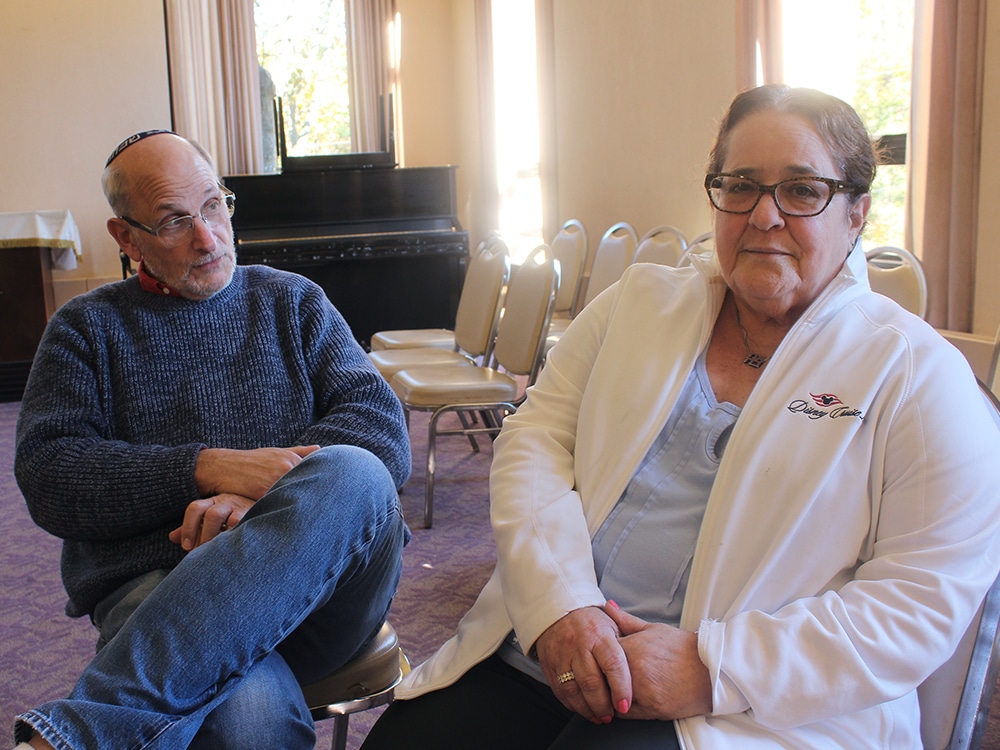
Stephen Avart looks at his wife, Karen Avart, shortly after the conclusion of the “Jewish Music for the Mind and Soul” program at Beth Sholom Congregation in Elkins Park, Pa., on Nov. 4, 2018. Karen was diagnosed with dementia several years ago. RNS photo by Adelle M. Banks
Janus, whose guitar playing was accompanied by her 11-year-old son’s tapping on an African drum, said her favorite part of the program is reaching people where they are, or where they once were.
“I see people who are living with dementia sing and I know that they’re accessing some part of their brain that we don’t normally see,” said Janus, a freelance rabbi who co-created the program with her mother-in-law, who struggles with language due to her dementia. Janus said her mother-in-law has “magical” moments when she claps and sings to familiar songs.
Experts say forms of dementia such as Alzheimer’s tend to damage the portions of the brain that help people retain recent memories but may allow them to maintain the long-term memories that include favorite tunes and prayers.
Janus offered the pilot program for three Sundays in November at Beth Sholom Congregation and has continued it in the following months.

Dolores Simmons, second from left, shows the stuffed mouse she chose out of basket of stuffed animals during a “Spirit Alive” service at Phoebe Richland, a skilled nursing center in Richlandtown, Pa., on Nov. 5, 2018. RNS photo by Adelle M. Banks
At Phoebe, Spirit Alive participants also spoke of how they look forward to the next time they meet.
“I think it makes you feel good, makes you feel different,” said Dolores Simmons, in an interview after holding a stuffed mouse during the Spirit Alive service. Asked what she meant by “different,” she said: “Blessed, a little on the religious side.”
The Rev. Scott Brooks-Cope, director of pastoral care services for Phoebe Ministries, said researchers have assessed the program with a tool often used to measure participation of people with dementia. They found results that reflected what Simmons reported.
“Folks who were involved in Spirit Alive programs versus being involved in traditional worship services were much more participative,” he said. “They were engaged, they smiled more, they slept less.”
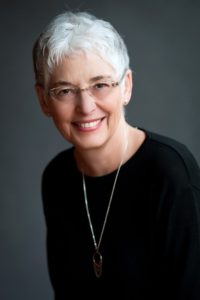
Susan H. McFadden. Photo by Kim Klein Photography
Susan McFadden, professor emeritus of psychology at the University of Wisconsin, Oshkosh, said other scholars have studied religion and dementia and found that sustaining a connection with worship and congregational life is a key contributor to quality of life for people with dementia because they can still feel valued.
“They get greeted by people; they get hugs,” said McFadden, co-author of “Aging Together: Dementia, Friendship and Flourishing Communities.” “The music, the Scripture, all of that is still going to be meaningful to them.”
Some facilities encourage the use of visual arts as they work with residents with cognitive challenges.
“Art is a way, particularly for people with dementia, to express themselves when they’ve lost their words,” said the Rev. Rebecca Church, director of pastoral services at Wesley Manor, a United Methodist-affiliated retirement community in Louisville, Ky.
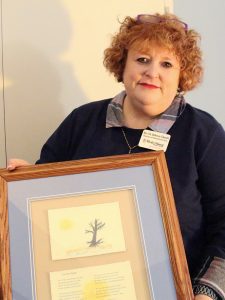
The Rev. Rebecca Church holds artwork created by a fellow minister with dementia in Louisville, Ky., on Nov. 28, 2018. RNS photo by Adelle M. Banks
She recalled a United Methodist minister, newly diagnosed with dementia, who participated in her “Where Art Meets the Heart” group. He drew a tree and painted it black to show it had been burned.
“As he explained it, the tree has been struck by lightning but there’s still growth because the roots are deep,” Church said of the man, who died several years ago.
While some facilities have made efforts to find innovative ways to meet the needs of people of faith who have dementia, some congregations also have stepped up to assist.
In the Houston area, for example, the interfaith nonprofit CarePartners organized “Gathering Place” programs for more than 1,000 people affected by memory loss at 50 churches and synagogues in 2017. While caregivers get a few hours of respite, the midday program offers their loved ones with mild to moderate dementia a chance to socialize over lunch and with games, music and exercise.
Houses of worship also are prominent on a national registry of “Memory Cafés,” monthly gathering spaces for people with Alzheimer’s. The organization Faith United Against Alzheimer’s suggests hosting those on its online resource, “Creating Dementia Friendly Faith Communities.”
McFadden, a frequent speaker on aging and dementia at churches and conferences, expects there will be expanding innovation by faith communities and clergy as baby boomers — who tend to be more vocal than the previous generation — start receiving diagnoses.
“They are going to be demanding responses from organizations like congregations,” she predicted. “They’re going to stand up and they’re going to say, ‘Don’t ignore us. We need this.’”


